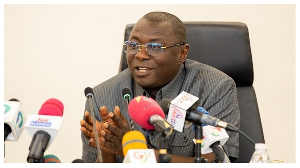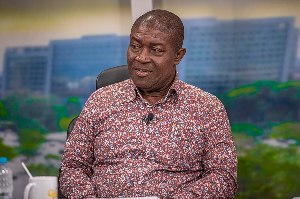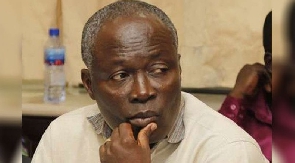A group of Ghana’s commercial creditors including BlackRock Inc. and Abrdn Plc backed the government’s offer to exchange about $13 billion of eurobonds for restructured notes, a crucial part of the West African nation’s debt rework.
“The committee considers that the legal and financial terms of the exchange offer and consent solicitation are in line with the agreement in principle reached between the committee and Ghana in June,” the group said in a statement on Thursday.
Investors will be able to swap their debt until September 30, the government said in an invitation posted on the London Stock Exchange earlier. The deal reached in June allows them to choose between two alternatives: the so-called DISCO or PAR option.
In the first option, investors will take a 37% haircut and receive interest payments of 5% from this year to July 2028, and 6% interest thereafter. Bondholders who pick PAR won’t face any nominal losses, but get 1.5% interest on the new bonds maturing in January 2037.
Caught by Surprise
The West African nation caught investors by surprise when it halted payments on most of its external debt in December 2022. At the time, the country’s overall public debt stood at about 575.7 billion cedis ($36.7 billion), including $13 billion in eurobonds.
Last May, the country that was once an investor darling secured a $3 billion bailout from IMF to be disbursed over three years, and contingent on Ghana meeting specific targets, including the herculean task of lowering its public debt to 55% of gross domestic product by 2028. Before the restructuring it was on course to reach 109% by that year.
Ghana completed a domestic debt swap last year and reached a deal with bilateral creditors in June to rework about $5 billion of loans in a bid to reach its debt-reduction target. Restructuring its eurobonds was one of the last steps of the overhaul.
Negotiated under the Group of 20’s Common Framework for debt treatment, the accord requires sovereign lenders and private creditors, such as eurobond holders, to get comparable terms.
Ghana has also made a debt-restructuring offer to private banks and contractors to which it owes $2.8 billion of debt, Accra-based Graphic Business reported, citing Finance Minister Dr. Mohammed Amin Adam.
Aside from the debt revamp, Ghanaians have struggled with annual inflation above 20% and faced tax increases to raise government revenue. With time short before presidential elections in December, there are concerns that a desire to win votes could cause some slippages.
“The committee reiterates the importance of Ghana sustaining economic reforms, including the establishment of credible fiscal and debt anchors,” said the group of eurobond investors. “Such reforms will be necessary for Ghana to regain international market access over time and for Ghana to meet its development objectives.”
Watch the latest edition of BizTech below:
Ghana’s leading digital news platform, GhanaWeb, in conjunction with the Korle-Bu Teaching Hospital, is embarking on an aggressive campaign which is geared towards ensuring that parliament passes comprehensive legislation to guide organ harvesting, organ donation, and organ transplantation in the country.
Click here to follow the GhanaWeb Business WhatsApp channel
Click to view details



Business News of Friday, 6 September 2024
Source: bloomberg.com

















